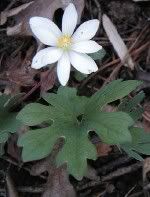

Bloodroot (Sanguinaria canadensis)
Folk Names: Coon Root, Indian Paint, Indian Plant, Indian Red Plant, King Root, Paucon, Pauson, Red Paint Root, Red Puccoon, Red Root, Sanguinaria, Snakebite, Sweet Slumber, Tetterwort, Yellow Puccoon
Description: Bloodroot is a small perennial growing up to six inches. It does best sheltered along wet banks, in fields, and in shady woods with rich soils and heavy leaf mould. The herb is indigenous to Northeast America, found from Quebec to Florida to Texas, Kansas, Arkansas, and Nebraska. The finger-thick rhizome root contains orange-red juice when fresh, while the dried root is yellow inside and brown outside. Its taste is bitter and harsh. The bloodroot produces solitary, pale-green, basal leaves from each bud on the root. When it first appears, the leaf is grayish-green and downy, and wrapped around the flower bud. The veined leaves are cordate or reniform, and palmate with five to nine lobes. Each leaf is paired with a solitary, naked flower stem each shorter than the footstalk of the leaf. The waxy flower is white with between eight and twelve petals in two or more whorls with golden stamens. It is one of the earliest and most beautiful spring flowers, closing at night or on cloudy days.. The seed is an oblong, narrow pod approximately one inch long.
Effects: strong
Planet: Mars, Jupiter
Element: Fire
Associated Deities:
Traditions:
This plant is endangered in some states, so be sure of your state laws before you harvest it.
The darkest red roots are considered the strongest. Should you be using a spell recipe that calls for blood, bloodroot has successfully been used as a substitute. This substitute is usually referred to as Diabolic Wine. Add a pinch of powdered bloodroot to any dark red wine. Mix well and leave overnight covered with a red cloth. Before use, pass your wand or palm over the container three times saying each time:
You are not wine but blood,
Living blood, Scarlet blood,
Living scarlet blood of mine.
Magic:
Bloodroot may be carried or worn for love. It is also carried to avert evil spells and negativity. This is particularly effective when carried in bag with a blue stone as protection from evil spells. Place it near doors and windows to protect the home, or sprinkle it near doors and windows to block entry of evil or hexes. To turn a spell back on its caster, throw a piece of bloodroot onto his or her doorstep.
Known Combinations:
none noted
Nutrition:
Mercantile Uses:
![]()
![]()
Parts Used : roots (collected in autumn after the leaves die down; must be stored in a dry place or it deteriorates quickly)
Bloodroot is a diuretic, emetic, emmenagogue, escharotic, expectorant, febrifuge, sedative, stimulant, tonic, purgative. Due to its dangerous indications however, it is not recommended for internal use, and external use should be closely monitored. The juice or powder has been used in poultices for swellings, aches, joints, fungoid tumors, ringworm, warts, sores, and eczema. The dried, powdered root was once used as snuff for polyps in the nose. Some Native Americans used the juice to paint over swellings and aches in their joints.
none
The roots produce a permanent reddish-orange dye with alum. Bloodroot is often cultivated in gardens, both in North America and in Europe.